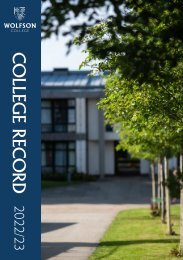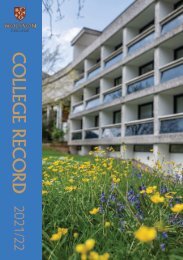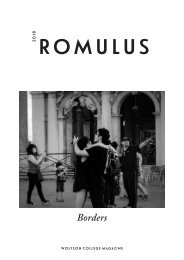You also want an ePaper? Increase the reach of your titles
YUMPU automatically turns print PDFs into web optimized ePapers that Google loves.
THE RECORD<br />
PERSONAL NEWS<br />
Books Published<br />
by Wolfsonians<br />
90<br />
Latin Grammarians on<br />
the Latin Accent<br />
Philomen Probert (GBF)<br />
Latin Grammarians on the Latin<br />
Accent offers a fresh perspective<br />
on a long-standing debate about<br />
the value of Latin grammarians writing about<br />
the Latin accent: should the information they<br />
give us be taken seriously, or should much of it<br />
be dismissed as copied mindlessly from Greek<br />
sources? This book focusses on understanding<br />
the Latin grammarians on their own terms:<br />
what they actually say about accents, and<br />
what they mean by it. Careful examination<br />
of Greek and Latin grammatical texts leads<br />
to a better understanding of the workings of<br />
Greek grammatical theory on prosody, and<br />
of its interpretation in the Latin grammatical<br />
tradition. It emerges that Latin grammarians<br />
took over from Greek grammarians a system<br />
of grammatical description that operated on<br />
two levels: an abstract level that we are not<br />
supposed to be able to hear, and the concrete<br />
level of audible speech. The two levels are<br />
linked by a system of rules. Some points of<br />
Greek thought on prosody were taken over<br />
onto the abstract level and not intended as<br />
statements about the actual sound of Latin,<br />
while other points were so intended. While<br />
this book largely sets aside the question<br />
whether the Latin grammarians tell us the<br />
truth about the Latin accent, focussing instead<br />
on understanding what they actually say, it<br />
begins to offer answers for those wishing to<br />
know when to ‘believe’ Latin grammarians in<br />
the traditional sense: the book shows which<br />
of their statements are intended – and which<br />
are not intended – as statements about the<br />
actual sound of Latin.<br />
Varro: De lingua Latina<br />
Wolfgang David Cirilo de Melo<br />
(GBF)<br />
Marcus Terentius Varro (116-27<br />
BC) was the greatest polymath<br />
of the Roman Republic. During<br />
his lifetime he authored several<br />
hundred books, and though many of them<br />
dealt with linguistic topics, De lingua Latina<br />
(‘On the Latin language’), the first large-scale<br />
linguistic treatment of Latin, was by far his<br />
most significant work. Originally consisting of<br />
twenty-five volumes one introductory, followed<br />
by six on etymology, six on morphology, and<br />
twelve on syntax – only Books 5–10, treating<br />
etymology and morphology, have come down<br />
to us in a more or less complete form, though<br />
a fair number of fragments of other volumes<br />
have been transmitted in other authors.<br />
These two volumes aim to provide a<br />
comprehensive treatment of this highly<br />
technical text in a new critical edition<br />
accompanied by a clear, accurate translation<br />
and full commentary. In Volume I, an<br />
introductory study outlines Varro’s life and<br />
works, analysing his own linguistic usage<br />
and setting his insights about language in<br />
their historical and intellectual context. His<br />
etymology and morphology are contrasted<br />
with our own modern methods, yielding<br />
important and sometimes surprising insights<br />
into how an educated Roman looked at the<br />
history of his own language: although his<br />
etymology is, by current standards, prescientific,<br />
it is actually quite often in agreement<br />
with modern etymology, while his morphology<br />
also has much in common with a modern<br />
approach, focusing on the question of how<br />
regular language is and providing arguments<br />
against and in favour of regularity. Detailed<br />
discussions of these and other of Varro’s<br />
linguistic ideas are brought to the fore in the<br />
exhaustive commentary in Volume II, which also<br />
sheds much-needed light on the work’s textual<br />
problems, cultural background, and distinctive<br />
Varronian style.<br />
COLLEGE RECORD <strong>2019</strong>
















